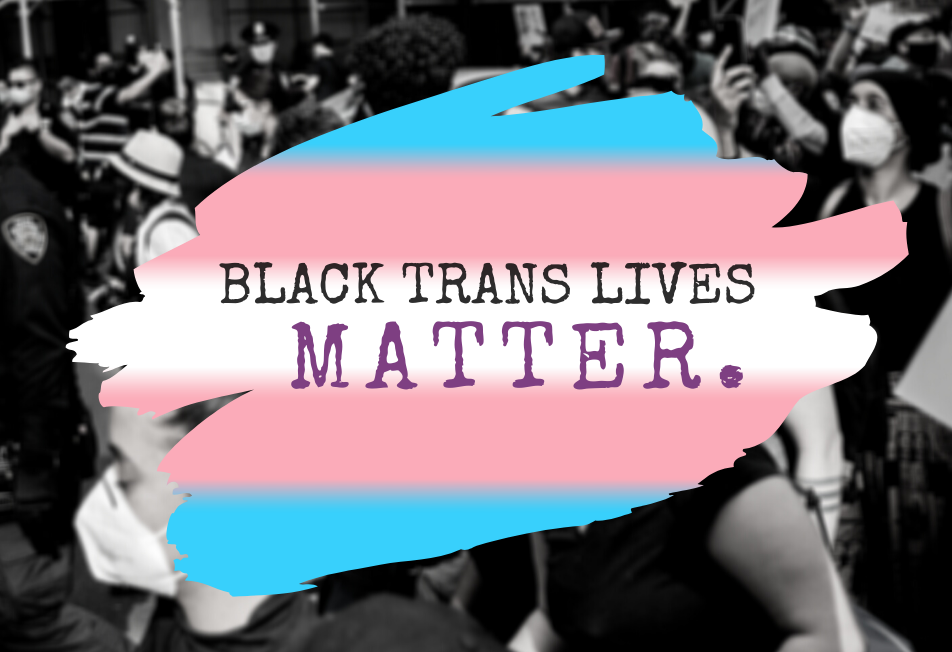Black Trans Lives Matter protests draw large crowds in the U.S.

“Today, I urge you to commit that today is the very last day that transphobia will claim the lives, loves, and joys of Black Trans people.”
Thousands of people gathered in Brooklyn, New York for “Black Trans Lives Matter” rally on Sunday, June 14. The rally called for justice for two Black trans women, Dominique “Rem’mie” Fells, and Riah Milton, who were killed last week pic.twitter.com/X7L94Avs0g
— TIME (@TIME) June 15, 2020
Speaking to a crowd of around 12,000 people, Ianne Fields Stewart, founder of the Okra Project, delivered her powerful words outside of the Brooklyn Museum in NYC Sunday afternoon. The address was part of one of many large-scale protests in honour of Black Trans lives taking place across the U.S. that day.
The Okra Project is a grass-roots organization that hires Black Trans chefs to cook healthy and culturally-specific meals for Black Trans people in their homes or community centres. Stewart is described on her website as a “Black, queer, and transfeminine New York-based storyteller working at the intersection of theatre and activism.”
The #BlackTransLivesMatter protest in Brooklyn right now is stunning. pic.twitter.com/glDticAc4o
— Joshua Potash (@JoshuaPotash) June 14, 2020
The Black Trans Lives Matter gatherings were organized in response to the recent murders of two Trans women — Dominique “Rem’Mie” Fells, 27, of Philadelphia, and Riah Milton, 25, of Cincinnati, Ohio — both of whom died last week.
Two Black trans women have been reported dead this week. Dominique “Rem’mie” Fells of Philadelphia, PA and Riah Milton of Liberty Township, Ohio. #RestInPower #BlackLivesMatter #BlackTransLivesMatter pic.twitter.com/2djG4i3U6c
— Raquel Willis (@RaquelWillis_) June 12, 2020
Other recent deaths include Nina Pop, a Black Transgender woman who was stabbed to death in her apartment in early May and Tony McDade, a 38-year-old Black Transgender man who was shot and killed by a Tallahassee police officer on May 27.
According to the Human Rights Campaign (HRC), there have been 14 reported murders of Trans and gender non-conforming people in the U.S. so far this year.
In 2019, the organization tracked 26 murders.
HRC says that 91 per cent of the reported murders of Trans and gender non-conforming people in 2019 were Black, and 81 per cent were under the age of 30.
But the number of actual deaths is likely higher, as violence against Trans men and women is often unreported or misreported due to authorities, media reports, and family members misidentifying the deceased, the campaign says.
Sunday’s protests were also organized in response to the Trump administration’s recent announcement that plans to end an Obama-era regulation prohibiting health care discrimination against transgender patients.
On Monday, in what is being called a “landmark” decision, the Supreme Court of the U.S. affirmed that sexual orientation and gender identity are protected characteristics under Title VII of the Civil Rights Act.
BREAKING NEWS: In a landmark decision, #SCOTUS affirms that sexual orientation and gender identity are protected characteristics under Title VII of the Civil Rights Act. pic.twitter.com/H3fPldo86C
— Human Rights Campaign (@HRC) June 15, 2020
Large-scale, peaceful protests took place in several U.S. cities — including Los Angeles, Chicago, and Boston.
I have no idea how many people are here today in Brooklyn for Black Trans Lives but it’s in the thousands #BrooklynLiberation pic.twitter.com/PPURIfyCKN
— Eliel Cruz (@elielcruz) June 14, 2020
They were largely led and organized by Black Trans women and intended to give attendees an opportunity to publicly mourn violence inflicted on the Trans community and demand justice.
Ten days ago, West Dakota called me with idea. A Brooklyn-based protest creating space and action for Black trans lives. She referenced a New York protest in 1917 when the NAACP assembled 10,000 all wearing white standing up against anti-Black violence. #brooklynliberation pic.twitter.com/NlzecJrolU
— Fran Tirado (@fransquishco) June 15, 2020
Protesters were asked to wear white as an acknowledgment of Black history. Speaking to CNN, rally co-organizer Fran Tirado said the decision was a reference to the 1917 NAACP’s Silent Protest Parade, one of the first public demonstrations led by Black Americans that was attended by around 10,000 people who also wore white.
